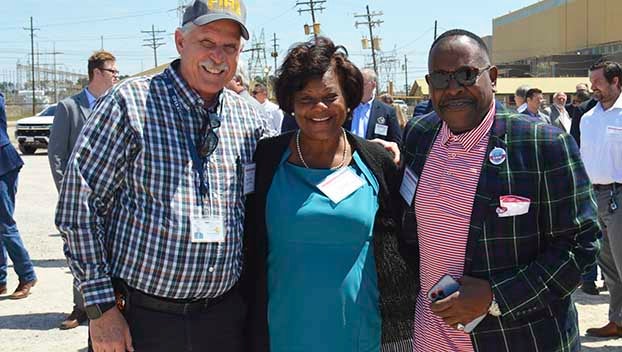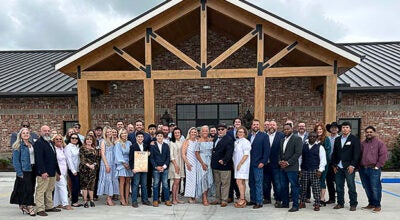For some, the tents replace lost homes while for some, the tents are home
Published 3:26 pm Wednesday, September 27, 2017
By Colleen Harrison
colleen.harrison@albertleatribune.com
The tents provide a stepping-stone for some and a key to survival for others.
“Tent City” is a temporary shelter in the parking lot of Robert A. Bowers Civic Center and it is home to hundreds of people who have been displaced thanks to the damage and destruction caused by Tropical Storm Harvey.
Norman Berry said he came to the temporary shelter from Thomas Jefferson Middle School, where he had been staying since about two or three days after Harvey hit the area in late August.
Berry lived on 22nd Street in Port Arthur before Harvey and the flooding forced him out of his home.
Berry said he has tried to get back to his house to start cleaning it out and seeing what, if anything, can be saved. His phone was destroyed in the process of evacuating his neighborhood, but his phone service is still intact, so Berry ventures out from the shelter each day to call his phone and check his messages.
He said the shelter has been integral for him and others while they try to get their lives back on track.
“They’re going above and beyond,” he said. “If they can help you, they go out of their way.”
Berry said the tents have been clean, and there has been plenty of food and water for those staying in the shelter.
“I don’t know what I’d do without them,” he said.
Jinine Pace has been in the shelter area for about four days while her apartment building in Port Arthur’s Crystal Creek Park is restored.
“That’s why I’m here,” she said. “There’s nowhere else to stay until your place gets fixed.”
Pace said the shelter has been nice and most of the people manning it have been welcoming. Pace has a pet dog and the pet is being cared for in another area of the camp. Pace is able to visit her dog whenever she likes.
She did say the air-conditioning unit in her tent makes it pretty cold at night, so much so that she typically sleeps with three blankets, but that it was easy enough to deal with.
According to Pace, there are plenty of services offered through the temporary shelter, including medical, case management and therapy. She said the camp has been very clean, and she’s allowed to go in and out of the camp as much as she likes, as long as she checks in with the officers at the entrance each time she goes through.
Pace isn’t crazy about how many people she shares her tent with, though, and said she doesn’t like living with strangers. She feels she never knows what to say or who the people are who sleep close to her.
“You just have to steer clear of the people who scare you and watch who you talk to,” she said.
Overall, though, Pace said she feels safe in the camp. She said there are a number of police officers, firefighters and National Guard members on site at all times.
Still, Pace is anxious to go back home.
“This isn’t home,” she said. “Don’t mistake it for a home. … I hate hurricanes.”
For Patricia Mooney, Tent City is just a means to an end.
“It is what it is,” she said. “What else is it supposed to be?”
Mooney lived on 12th Street in Port Arthur, where she had to be rescued from when the rising water reached dangerous levels in her home. She has been in the shelter by the Civic Center for about two weeks. She’s not sure yet what will be left of her home when all is said and done.
Mooney, like so many others, has taken refuge in Tent City, where she said she gets three hot meals a day and has somewhere safe to stay until she figures out what’s next.
“We all look out for each other,” she said. “I feel like it’s got to get better. The Lord has something better coming.”
For others, the tents are more than a temporary home.
One woman, Krista, said Tent City is the closest thing she has had to a home in months. Krista asked to only be identified by her first name, as she was worried about possible repercussions from other people living in the shelter.
Krista said that before Harvey, she was living and working on the streets, never knowing when she’d next be able to eat or have somewhere safe to sleep. She said she did what she “had to” when she was desperate, but she tried to avoid doing anything illegal when she could. Krista said sometimes she “can’t always avoid” it, though.
“Here, at least we got food and water,” she said. “I’m scared of what’s gonna go down after this goes away. Don’t know what I’m gonna do then.”





